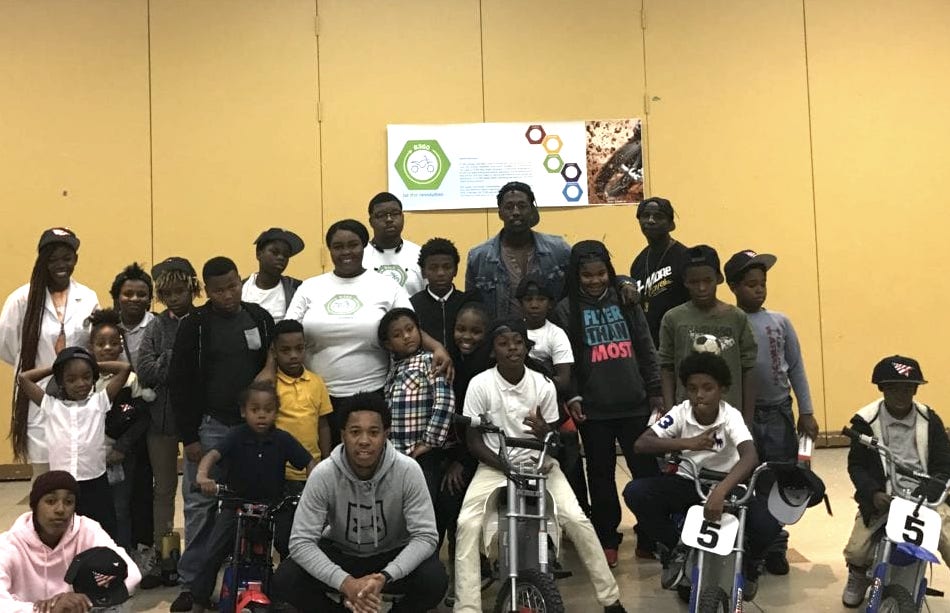Serving youth in Baltimore city, the founders of four Black-led organizations — The Be. org, Mentoring Mentors, B-360 and I AM MENtality — formed individually as they recognized distinct needs in their community and built different strategies toward making an impact.
Tonee Lawson leads the six-year-old be.org’s work to develop character, talents and leadership skills, both in school-based programs and through conferences, while at three-year-old B-360, Brittany Young harnesses dirt bike culture to teach STEAM skills and promote safety. Alphonso Mayo founded Mentoring Mentors in 2015 to enhance academic achievement, inspire confidence, and expose youth to positive mentoring experiences, while Darren Rogers’ MENtality, also founded in 2015, provides leadership development for male youth in schools and after-school programs.
It has brought partnerships on programming among orgs looking to not just teach skills, but also provide support to address the underlying social and confidence gaps that must also be cleared to help youth shine. As Rogers put it, “we’ve been intertwining what we do.”
And as they got to know each other, the leaders found that they shared passion for their work, and a desire for organizational leadership that is reflective of the community it is serving. They also came to support one another, trading grant applications and sharing resources like transportation and space. Mayo likens it to neighbors on a block trading the sugar they might need to get something fully baked.
“It was for the greater good of both families and we were able to make an impact,” Mayo said.
Now they’re applying that approach to build capacity that will help each organization grow over the long term: The organizations are forming a collaborative to help build human capacity and work together toward sustainability.
Supported by $83,000 in grant funding from the T. Rowe Price Foundation over three years and a match from the four orgs, the collective is hiring a chief development officer that will work with all four organizations to create fundraising strategies, grow fundraising infrastructure for each org, help to build a team and work on social media and marketing. The application is open through July 17.
“They will work with each organization part-time to really help us individually build the revenue to be sustaining over the next three years,” Lawson said. “They will also give us additional support to make sure our organizations are strong enough to be able to maintain large budgets and be able to program and support areas where we … provide services.”
Interested in helping 4 Black led organizations serving the community? #werehiring a FT Cheif Development Officer ! Share and Apply Todayhttps://t.co/lBvDleqnp0 #remotejobs #SupportBlackBusinesses #BLACKOUTDAY2020 #supportblackleaders pic.twitter.com/Zrq0gs0fbv
— Brittany Young (@cntknockBhustle) July 7, 2020
The effort shows an approach to build capacity in Black-led organizations rather than a single program. And they’re taking a collaborative approach to get there.
“Collaboration is an important value at the T. Rowe Price Foundation and during these times it is more important than ever that we lock arms with community to help realize positive change,” said John Brothers, president of the T. Rowe Price Foundation. “We believe that partnerships are key to helping the social sector grow stronger. We are piloting a new approach to help organizations ‘share sugar’; to align resources, build organization and leadership capacity in order to realize their important missions. We hope this grant can be helpful in doing just that and we are excited about what the learnings will teach us all.”
While the ability to lean on each other has been crucial for the org leaders, growth has also taken sacrifice from the individuals. They’re committed to bringing change, even if that means dipping into personal finances and time.
But there is a limit.
For one, they need to take care of themselves so the organizations can sustain, and the leaders said the T. Rowe Price Foundation recognized that was important. And they’ve also struggled when it came to winning funding that will help the organizations to be sustainable. And as is often true among grassroots organizations, they aren’t trained as nonprofit leaders. They started these organizations to meet a need, and additional skills are being built as they grow.
“We’ve done so much with so little, we’re almost to the point where we’ve hit a funnel,” Lawson said. “If we have these additional resources, we can definitely balloon and grow and be able to have greater impact. We’re almost to the point of stifling our own growth if we don’t have additional funding.”
It’s an area where systemic racial disparities play out. Mayo said he sees the gap between funding at Black and white-led organizations. Recently released data further proves it out: According to a report from the Chronicle of Philanthropy, nonprofits with Black leaders had revenue that was 45% lower than at groups led by whites over a three-year period studied.
“We want to get the top-tier talent,” he said. “We know college graduates are coming out looking for work. A lot of them are our colleagues or our friends and we can’t hire them because we don’t have the capacity to. So we lose out on good quality employees and potentially stretching our growth because we can’t afford it. It doesn’t mean we can’t make it happen.”
Before you go...
Please consider supporting Technical.ly to keep our independent journalism strong. Unlike most business-focused media outlets, we don’t have a paywall. Instead, we count on your personal and organizational support.
Join our growing Slack community
Join 5,000 tech professionals and entrepreneurs in our community Slack today!

The person charged in the UnitedHealthcare CEO shooting had a ton of tech connections

From rejection to innovation: How I built a tool to beat AI hiring algorithms at their own game

Where are the country’s most vibrant tech and startup communities?


